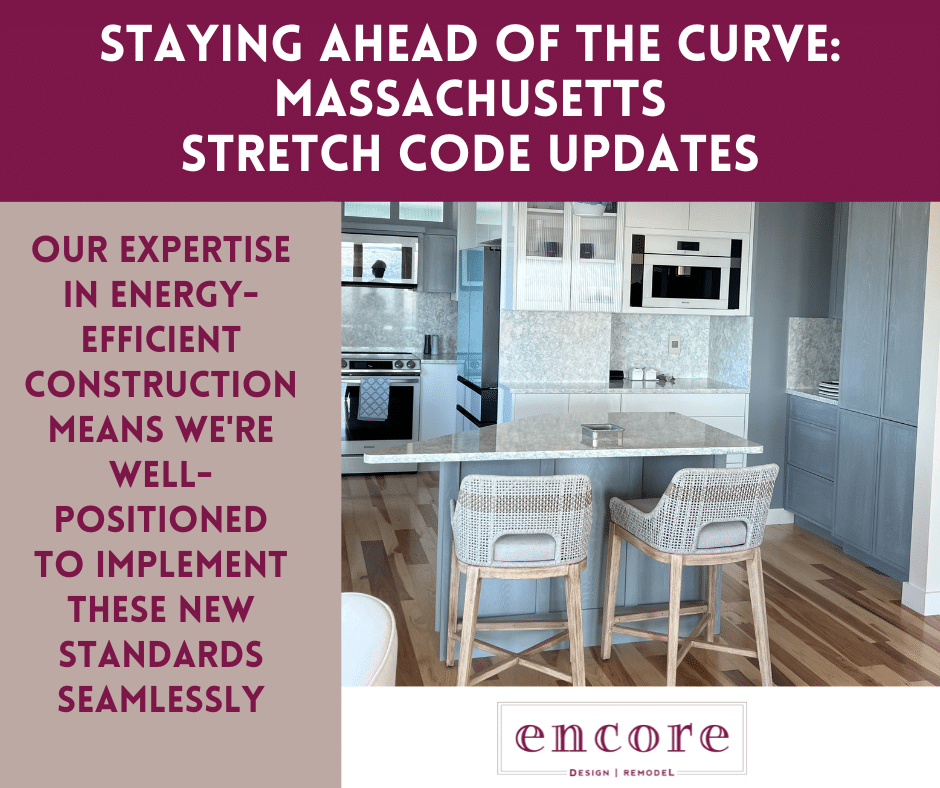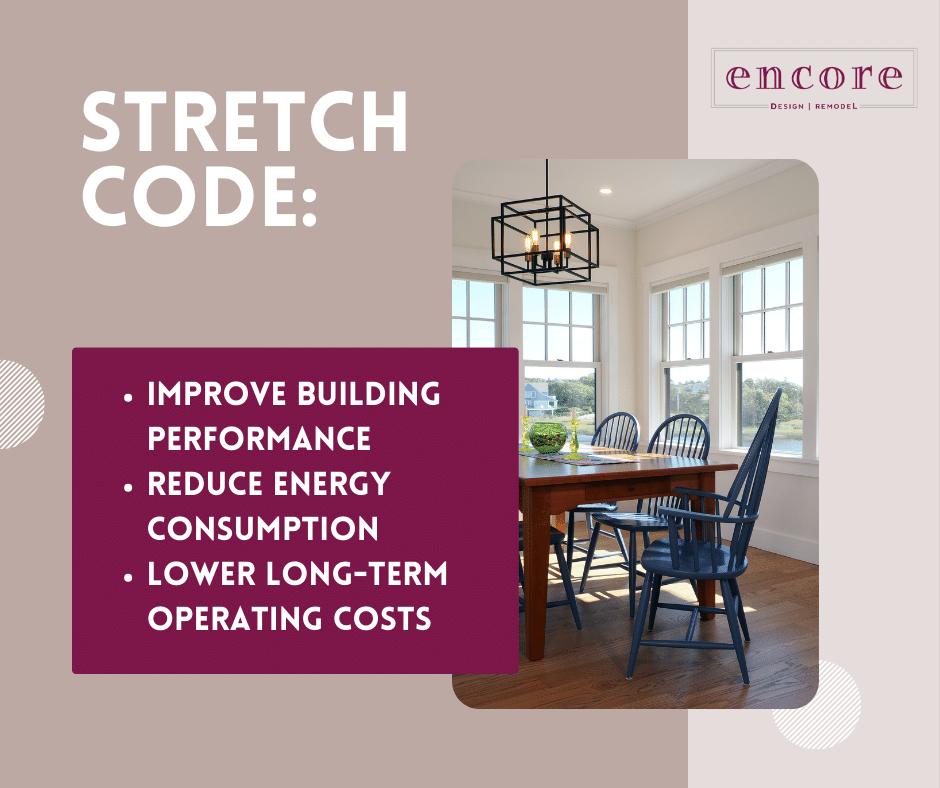At Encore Construction, we pride ourselves on staying at the forefront of industry regulations and best practices. As Massachusetts prepares to implement significant updates to its Stretch Energy Code, we want to assure our clients that we are fully prepared to meet and exceed these new standards.

The Massachusetts Stretch Code, first introduced in 2009, has been a crucial tool in promoting energy-efficient construction across the state. Now, with the Climate Act of 2021, we’re seeing even more ambitious changes on the horizon. The Department of Energy Resources (DOER) has taken over the promulgation of the Stretch Code and introduced a new Municipal Opt-in Specialized Energy Code.
These updates, which took effect in 2023, brought building practices in line with the state’s greenhouse gas emission goals. The new regulations are divided into two main sections:
- Covering residential low-rise construction
- Addressing commercial and other construction, including most multi-family buildings
One of the most significant changes is the introduction of the Specialized Code, which goes beyond the Stretch Code to ensure new construction aligns with Massachusetts’ long-term climate objectives. This code will be available for municipalities to adopt, pushing the boundaries of energy-efficient building even further.
At Encore Construction, we’re already gearing up for these changes. Our team is thoroughly studying the updated requirements, which include:
- More stringent HERS (Home Energy Rating System) index scores for residential buildings
- New Thermal Energy Demand Intensity (TEDI) requirements for larger commercial buildings
- Enhanced provisions for electric vehicle charging infrastructure
- Stricter air leakage limits and thermal bridge accounting
We understand that these changes may seem daunting, but we’re here to guide our clients through the transition. Our expertise in energy-efficient construction means we’re well-positioned to implement these new standards seamlessly.
One question many clients are asking is how the new Stretch Code updates will impact construction costs. To answer their question, and yours we are here to tell you that the new Stretch Code updates in Massachusetts will likely impact construction costs in several ways:
- Increased energy efficiency requirements: The updated Stretch Code lowers the maximum allowable HERS (Home Energy Rating System) index scores for residential buildings. This means homes will need to be more energy-efficient, potentially requiring additional insulation, better windows, and more efficient HVAC systems, which could increase upfront construction costs.
- Electrification incentives: The new code encourages electrification by setting lower HERS requirements for all-electric homes compared to those using fossil fuels. While this may increase initial costs for electric heating and cooling systems, it could lead to long-term energy savings.
- Ventilation upgrades: The updated Stretch Code adds requirements for energy or heat recovery ventilation in residential buildings. This additional equipment will likely increase construction costs but improve indoor air quality and energy efficiency.
- Electric vehicle (EV) charging infrastructure: The code requires more extensive EV charging preparations, with at least one space per home and 20% of spaces in new multi-family parking lots needing electrical wiring for future EV charging. This will add to construction costs but prepare buildings for future EV adoption.
- Thermal bridge accounting: For commercial buildings, the updated Stretch Code introduces thermal bridge accounting requirements. This may necessitate more detailed design considerations and potentially additional materials to minimize heat loss through the building envelope.
- Air leakage limits: The code strengthens air leakage limits for commercial buildings, which may require more careful construction techniques and additional air sealing measures.
- Ventilation energy recovery: Enhanced requirements for ventilation energy recovery in commercial buildings will likely increase HVAC system costs but improve overall energy efficiency.
While these updates are likely to increase initial construction costs, it’s important to note that they are designed to improve building performance, reduce energy consumption, and lower long-term operating costs. The exact impact on construction costs will vary depending on the specific project and building type.
As we move towards a more sustainable future, Encore Construction is committed to delivering projects that not only meet code requirements but exceed expectations in terms of energy efficiency and environmental responsibility. We believe these updates to the Stretch Code are a positive step towards reducing our carbon footprint and creating more comfortable, efficient buildings for our clients.
Rest assured, when you choose Encore Construction for your next project, you’re partnering with a team that’s ahead of the curve. We’re ready to embrace these new regulations and continue our tradition of excellence in construction, all while contributing to a greener Massachusetts.




